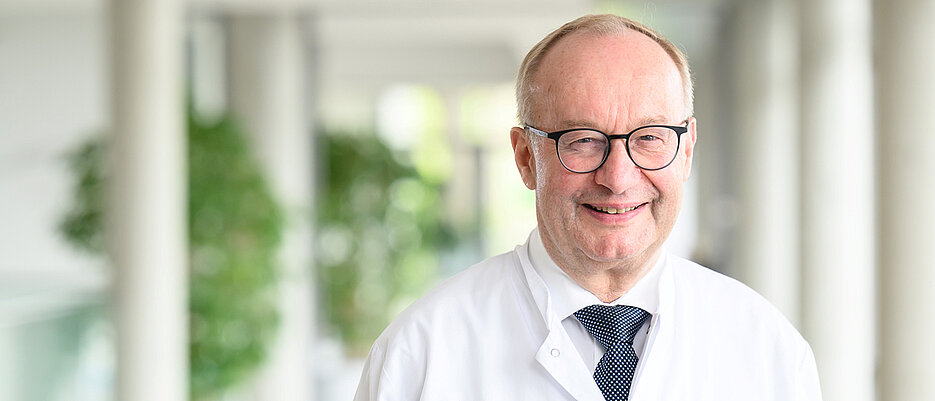An Honour and a Commitment
09/25/2024Professor Hermann Einsele is the world's leading expert in the field of immunotherapies for haematological cancers. He has now been elected as a new member of the Leopoldina and the Academia Europaea.

Charles Darwin, Marie Curie, Albert Einstein, Emmanuelle Charpentier - they were or are all members of the Leopoldina. The German National Academy of Sciences is one of the oldest and most renowned scientific academies in the world. Founded as the ‘Academia Naturae Curiosorum’ in Schweinfurt in 1652, the first members of the ‘Academy of Natural Scientists’ were primarily concerned with medical and scientific issues and made a significant contribution to scientific enlightenment. To this day, the Leopoldina stands for scientific excellence and interdisciplinary exchange. Nomination and election as a member is both a recognition of a researcher’s lifetime achievement and a platform for actively shaping the scientific landscape.
Great acknowledgement of scientific achievements
Professor Hermann Einsele, Director of the Department of Medicine II at the University Hospital Würzburg, is delighted to have been accepted into the circle of the around 1,600 Academy members from 30 countries. ‘I am very pleased about this great acknowledgement of my scientific achievements to date and look forward to being able to actively contribute to the work of this long-established National Academy as a member,’ says the internal medicine and cancer specialist.
Congratulations come from University President Paul Pauli: ‘This honour is a well-deserved recognition of Hermann Einsele's outstanding contributions and commitment to science and to cancer research in particular. His achievements inspire not only colleagues but also the next generation of researchers.’
In order to maintain its membership base, the Leopoldina elects around 50 new members each year in a multi-stage selection process. The members are organised into specialised sections, which in turn are grouped into four classes: natural sciences, life sciences, medicine as well as humanities, behavioural and social sciences. Independent of economic or political interests, the researchers work on future societal issues and advise German politicians and international institutions on important matters. Their opinions on topics such as health, climate change and technology carry great weight.
A year earlier, in 2023, Hermann Einsele had already become a member of the Academia Europaea. Founded in 1988 and based in London, this European non-governmental academic society contributes to strengthening European and international research through a wide range of activities and promotes the global exchange of knowledge and innovation.
Important cancer therapies authorised
Hermann Einsele's expertise lies primarily in the field of stem cell transplantation and immunotherapies for haematological cancers. Many of the developments in which he was involved have revolutionised the clinical standard in the treatment of blood and bone marrow cancer. For example, he was instrumental in the research and clinical development of CAR-T cell therapy, an innovative immunotherapy for the treatment of certain types of cancer, in particular multiple myeloma and other haematological malignancies.
In this type of therapy, the T-cells of patients are genetically modified so that they can target and attack cancer cells. Professor Einsele has also been at the forefront of research into allogeneic and autologous stem cell transplantation, particularly when it comes to improving transplantation procedures and combating complications such as graft-versus-host disease and severe infections in immunocompromised patients.
About Hermann Einsele
Born in Stuttgart, Hermann Einsele studied human medicine at the Universities of Tübingen, Manchester and London. He became a specialist in internal medicine in 1991 and a specialist in haematology/oncology in 1996. Professor Einsele earned his Habilitation in 1992 at the Department of Haematology, Oncology, Rheumatology and Immunology at the University of Tübingen and was appointed adjunct professor in 1999. He was a visiting professor at the City of Hope Hospital in Duarte (California) and at the Fred Hutchinson Cancer Research Centre in Seattle.
In June 2004, Hermann Einsele was appointed to the Chair of Internal Medicine at the University of Würzburg. He has been Director of the Department of Medicine II at the University Hospital Würzburg since December 2004.
Hermann Einsele served on the University Board of Julius-Maximilians-Universität Würzburg (JMU) for six years as Vice-President for Research and Academic Career Development and is an active member of numerous national and international research associations, advisory boards and societies. Since 2023, he has been spokesperson for the National Centre for Tumour Diseases NCT WERA.
Recipient of numerous awards
In 2003, Hermann Einsele received the van Bekkum Award, the most prestigious annual European award for research in the field of stem cell transplantation. In 2011, he was elected Honorary Fellow of the Royal College of Pathology in London, and one year later, in 2012, he gave the Nobel Lecture Stem Cell Biology/Transplantation, Nobel Forum Karolinska Institute (Sweden). Since 2014, he has been a member of the Academy of Sciences and Literature, Mainz, and since 2017, he has regularly been recognised as an ISI Highly Cited Researcher in the category of Clinical Medicine. In 2022, Professor Einsele received the prestigious Erasmus Haematology Award from Erasmus University Rotterdam (Netherlands) for special achievements in the field of cancer immunotherapy and the Bavarian Constitutional Order.






